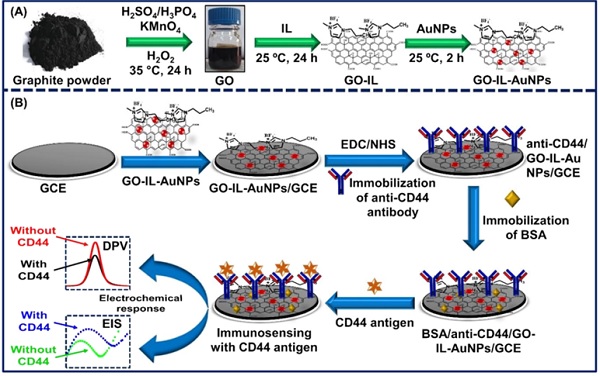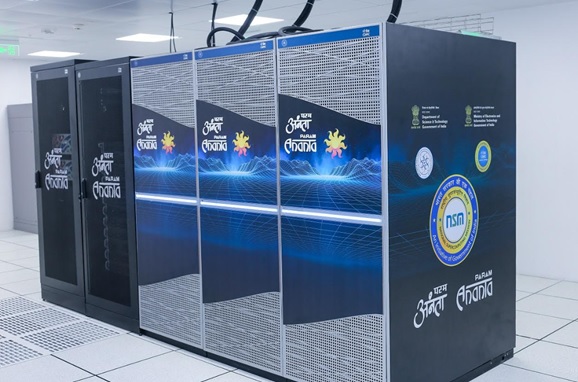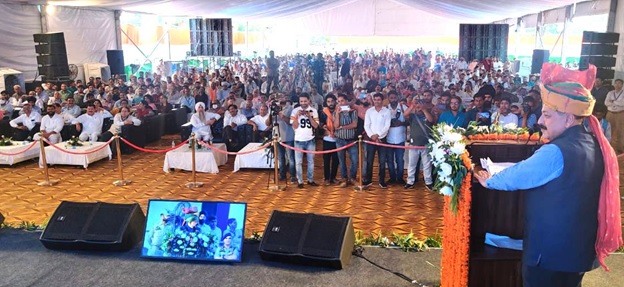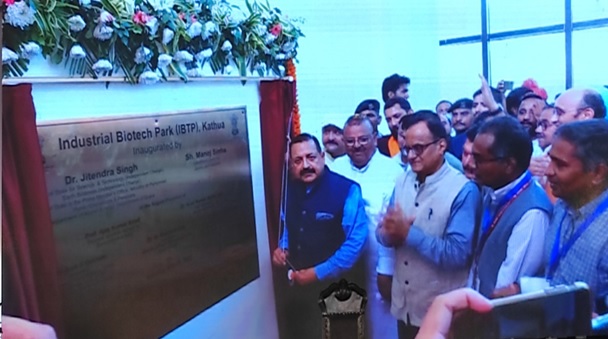
Figure: Schematic Depiction of (A) Synthesis of the GO-IL-AuNPs Hybrid Nanocomposite and (B) Step-Wise Fabrication of the BSA/anti-CD44/GO-IL-AuNPs/GCE (Immunosensor)
Image Source: ACS Appl. Mater. Interfaces 2022, 14, 20802−20812
Breast cancer is the common term for breast tumor subtypes with distinct molecular and cellular origins and clinical behavior. Breast cancer is the most frequently diagnosed life-threatening cancer and the leading cause of cancer death in women worldwide. An estimated 2.2 million breast cancer cases were diagnosed worldwide in 2020.
Scientists across the globe are working to develop effective diagnostic procedures for early detection and thus prevention of breast cancers. The available tests include imaging tests that allow doctors to examine internal organs in noninvasive ways. Computerized tomography (CT) scan, bone scan, magnetic resonance imaging (MRI), positron emission tomography (PET) scan, ultrasound, and X-ray are examples of noninvasive tests. Further doctors can also advise biomolecular tests such as ELISA and Biopsy that are invasive.
The existing imaging tests have limitations, like it can sometimes generate low-quality images or morphological structures. Invasive techniques like biopsy can be painful. In addition, the methods are time-consuming, expensive, and require skilled personnel to perform the tests.
To overcome the above limitations, a team of scientists from CSIR-Advanced Materials and Process Research Institute (AMPRI), Bhopal, has developed a highly sensitive electrochemical immunosensor for the detection of a breast cancer biomarker CD44 antigen, the study has been published in the April 2022 issue of ACS Applied Materials & Interfaces.
The CD44 antigen is a cell-surface glycoprotein involved in cell-cell interactions, cell adhesion, and migration. In humans, the CD44 antigen is encoded by the CD44 gene on chromosome 11. Studies have demonstrated that CD44 remains one of the major molecules associated with breast cancer and several other kinds of tumors. Hence the early detection of CD44 antigen could be a crucial biomarker for exploring the development of breast cancer at a very early stage.
Serological-based diagnostics gain considerable attention for diagnosing breast cancer biomarkers in clinical samples. The most common are optical, electrochemical, and mass-sensitive biosensors. The biosensor-based detection has several advantages over the existing cancer detection diagnostic tests: high specificity, rapid detection, ultralow detection limit (LOD), cost-effectiveness, portability, and low sample volume requirement. In addition, they have remarkable biocompatibility and stabilizing potential for biomolecules.

Breast cancer is the common term for breast tumor subtypes with distinct molecular and cellular origins and clinical behavior. Breast cancer is the most frequently diagnosed life-threatening cancer and the leading cause of cancer death in women worldwide. An estimated 2.2 million breast cancer cases were diagnosed worldwide in 2020.
Researchers from CSIR-AMPRI have devised a highly sensitive immunosensor using Graphene oxide with a large surface area and contains different functional chemical groups on its surface, making it a suitable electrode material in electrochemical immunosensor fabrication with higher sensitivity. ‘Graphene oxide has low conductivity, so we have used highly conductive materials like Ionic liquids to enhance its conductivity, said Dr. Raju Khan, Principal Scientist, CSIR-AMPRI.
To further improve the properties of the GO-IL nanocomposite, gold nanoparticles (AuNPs) were also combined with the GO-IL nanocomposite. The resultant GO-IL-AuNPs hybrid nanocomposites were also previously used by many researchers to develop an electrochemical sensor for the detection of dopamine in urine and a voltammetric biosensor for the detection of 2,4-dichlorophenol up to nanomolar concentration.
Herein, we synthesized an electrochemical immunosensor constructed using GO-IL-AuNPs on a glassy carbon electrode (GCE) to detect CD44 antigen, a breast cancer biomarker, added Dr. Khan.
The scientists used various methods to validate the structural and functional capabilities of the synthesized nanomaterials using UV - visible spectroscopy, FTIR spectroscopy, Raman spectroscopy, X-raydiffraction (XRD), field-emission scanning electron microscopy (FESEM), and transmission electron microscopy (TEM).
The devised process exhibits excellent electrochemical detection performance against the CD44 biomarker responsible for breast cancer. Furthermore, our work demonstrated that the developed immunosensor has a wide detection range and an ultralow limit of detection (LOD) compared to other reported biosensors. Therefore, the proposed immunosensor could be successfully utilized in the point-of-care clinical applications for rapid detection of the CD44 antigen, added Dr Khan.
The research team led by Dr Raju Khan, included Pushpesh Ranjan, Shalu Yadav, and Mohd. Abubakar Sadique.
India Science Wire
ISW/KPS/CSIR/BREAST CANCER/ENG/06/06/2022





